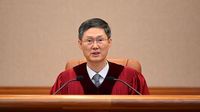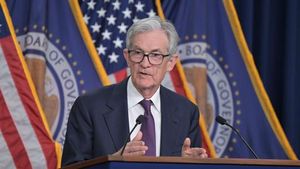The exchange rate between the South Korean won and the US dollar experienced significant fluctuations on April 4, 2025, amid a backdrop of political developments and international economic concerns. As of 11:30 AM KST, the won was trading at 1439.70 won per dollar, according to Investing.com, reflecting a notable decline from the previous day's closing rate.
The dollar's weakness follows President Donald Trump's recent announcement of trade tariffs, which has raised concerns about the US economy's stability. This announcement has led to a broader depreciation of the dollar, particularly against major currencies like the euro and the Japanese yen. The dollar-won exchange rate opened at 1450.5 won, down 16.5 won from the prior week's closing price, and showed volatility throughout the morning.
Early trading saw the won-dollar rate dip to 1431 won, after the Constitutional Court's announcement regarding the impeachment of former President Yoon Suk-yeol, which many analysts believe contributed to a decrease in domestic political uncertainty. This drop marked a significant moment, as the exchange rate had not fallen to this level since late February 2025. The rate briefly reached 1430.2 won, reflecting a decline of 36.8 won from the previous day, the largest decrease in over two years.
The fluctuations in the exchange rate are indicative of a complex interplay between domestic political events and external economic pressures. Following Trump's tariff announcements, which effectively declared a trade war, the dollar index fell sharply, reflecting a broader trend of dollar weakness. The Bloomberg Dollar Spot Index recorded a 2.1% drop on April 3, marking its largest intraday decline since its inception in 2005.
Market analysts noted that the dollar's decline was compounded by fears of an economic slowdown in the US, as indicated by falling US Treasury yields. A securities dealer commented, "The dollar's weakness is linked to the decline in US Treasury yields, and we are seeing it fluctuate around the 1450 won level. While there is a global trend of dollar weakness, the extent of the drop seems excessive, and we might see some recovery during the day."
As the Constitutional Court prepared to announce its verdict on the impeachment trial, the market was on edge, anticipating increased volatility. The verdict was read at 11 AM, and the subsequent reaction was immediate: the dollar-won rate dropped sharply as the judges confirmed the impeachment with a unanimous decision. This decision was seen as a pivotal moment in South Korea's political landscape, potentially paving the way for a more stable economic environment.
At 11:22 AM, following the formalization of the impeachment by the court, the exchange rate rebounded, briefly surpassing the 1440 won mark. This swift recovery demonstrated the market's sensitivity to political developments, as investors reacted to the resolution of uncertainty surrounding Yoon's presidency.
In a broader context, the Bank of Korea's Governor Lee Chang-yong had previously remarked on the volatility of the dollar-won exchange rate, attributing some of the fluctuations to political factors. He noted that the rate had surged from 1400 won to 1470 won, with approximately 30 won of that increase being due to political instability linked to the impeachment proceedings.
As of the latest reports, the dollar index, which measures the dollar's value against six major currencies, stood at 101.98, down from 103 the previous day. This marked the lowest level for the dollar index in about seven months, underscoring the ongoing challenges faced by the US currency in the global market.
In summary, the events of April 4, 2025, highlight the intricate relationship between domestic political issues and international economic conditions. The sharp movements in the dollar-won exchange rate illustrate how political decisions can ripple through financial markets, affecting currency values and investor sentiment. As the situation continues to evolve, both domestic and international observers will be closely monitoring the implications of these developments for South Korea's economy and its position in the global market.


![[특보] 원·달러 환율 25원 넘게 하락…코스피 혼조세](https://thumbor.evrimagaci.org/lb5G5HoEKkPrnaCbTVogzjDlfNM=/200x0/tpg%2Fsources%2F5acbfff8-92a4-419b-a6a0-479a59c4261b.jpeg)

![[서환] 달러-원, 美경기 우려·弱달러 가속에 급락…16.80원↓](https://thumbor.evrimagaci.org/ETfjOrJfrdpsEA6gzJ31fgmKtgg=/200x0/tpg%2Fsources%2F92499696-ade1-42e3-8fbf-b19ed3110a1e.jpeg)



